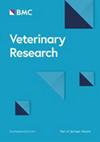Prevalence and risk factors associated with nasal carriage of methicillin-resistant staphylococci in horses and their caregivers
IF 3.7
1区 农林科学
Q1 VETERINARY SCIENCES
引用次数: 0
Abstract
Antimicrobial resistance is a global threat, and pet-associated strains may pose a risk to human health. Equine veterinarians are at high risk of carrying methicillin-resistant staphylococci (MRS), but specific risk factors remain elusive, and few data are available for other personnel involved in the horse industry. The prevalence, characteristics, and risk factors for nasal carriage of MRS in horses and their caregivers were studied in northwestern Italy. Nasal swabs from 110 asymptomatic horses housed at 21 barns and 34 human caregivers were collected. Data on barns, horses, and personnel were acquired through questionnaires. The samples were incubated in selective media, and the bacterial isolates were identified by mass spectrometry. Risk factors were investigated by Poisson regression. MRS were isolated from 33 horses (30%), 11 humans (32.4%) and 3 environmental samples (14.2%). Most isolates were multidrug resistant (MDRS). The prevalence of MRS and MDRS was greater in racehorses and their personnel than in pleasurable and jumping/dressing horses. MRS carriage in caregivers was associated with an increased prevalence of MRS carriage in horses. The frequency of antimicrobial treatments administered in the barn during the last 12 months was a risk factor for MRS carriage in horses [prevalence ratio (PR) 3.97, 95% CI 1.11, 14.13] and caregivers (PR 2.00, 95% CI 1.05, 3.82), whereas a good ventilation index of the horse tabling environment was a protective factor (PR 0.43, 95% CI 0.20, 0.92). Our data reveal relevant interactions occurring between bacterial communities of horses and humans that share the same environment, suggesting that One Health surveillance programs should be implemented.马匹及其饲养者鼻腔携带耐甲氧西林葡萄球菌的流行率和相关风险因素
抗菌素耐药性是一个全球性威胁,宠物相关菌株可能对人类健康构成威胁。马匹兽医携带耐甲氧西林金黄色葡萄球菌(MRS)的风险很高,但具体的风险因素仍然难以捉摸,而马业其他从业人员的相关数据也很少。我们在意大利西北部研究了马匹及其护理人员鼻腔携带 MRS 的流行率、特征和风险因素。研究人员从 21 个马厩中饲养的 110 匹无症状马匹和 34 名人类护理人员身上采集了鼻拭子。通过问卷调查获得了有关马厩、马匹和人员的数据。样本在选择性培养基中培养,细菌分离物通过质谱法进行鉴定。通过泊松回归法对风险因素进行了调查。从 33 匹马(30%)、11 个人(32.4%)和 3 份环境样本(14.2%)中分离出了 MRS。大多数分离株具有多重耐药性(MDRS)。MRS和MDRS在赛马及其饲养人员中的流行率高于在赛马和跳马/驯马中的流行率。护理人员携带 MRS 与马匹携带 MRS 的流行率增加有关。过去12个月中在马厩中使用抗菌剂的频率是马匹(患病率比(PR)为3.97,95% CI为1.11,14.13)和护理人员(PR为2.00,95% CI为1.05,3.82)携带MRS的风险因素,而马厩环境良好的通风指数则是一个保护因素(PR为0.43,95% CI为0.20,0.92)。我们的数据揭示了共享同一环境的马和人类细菌群落之间发生的相关相互作用,建议实施 "同一健康 "监测计划。
本文章由计算机程序翻译,如有差异,请以英文原文为准。
求助全文
约1分钟内获得全文
求助全文
来源期刊

Veterinary Research
农林科学-兽医学
CiteScore
7.00
自引率
4.50%
发文量
92
审稿时长
3 months
期刊介绍:
Veterinary Research is an open access journal that publishes high quality and novel research and review articles focusing on all aspects of infectious diseases and host-pathogen interaction in animals.
 求助内容:
求助内容: 应助结果提醒方式:
应助结果提醒方式:


